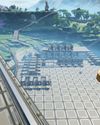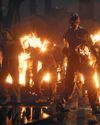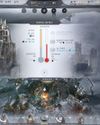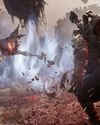
Games master
Google Brain’s deep learning approach to floorplanning is reminiscent of another Google AI project we’ve featured here, AlphaGo, which in 2015 became the first computer Go program to beat a human professional Go player without handicap on a full-sized board. AlphaGo later branched into AlphaStar, an AI that plays StarCraft II at the Grand Master level.
We have previously suggested that a robot-controlled future in which humans are hunted for sport is a likely one, but we’ve had a bit of trouble with our blood pressure lately, and have decided techno-utopianism is just as reasonable, in the style of Iain M Banks’ Culture novels.
The crucial difference here is that, while the murderous AI of the Terminator is a human invention, the benevolent Minds that oversee the Culture are AIs built by AIs, and it seems to work out better that way.
There’s a step in microchip design known as floorplanning, in which the building blocks of a chip are marked out before they go anywhere near a silicon wafer. You put some processing cores here, a touch of cache RAM there, top it all off with some GPU cores over here, and decorate with off-chip connections around the edges. Related areas cluster together so that the electrical pathways most commonly taken are the shortest. The whole thing needs to be verified before it’s made, of course, and one of the great skills of chip design is floorplanning them to be as efficient as possible.
This story is from the {{IssueName}} edition of {{MagazineName}}.
Start your 7-day Magzter GOLD free trial to access thousands of curated premium stories, and 9,000+ magazines and newspapers.
Already a subscriber ? Sign In
This story is from the {{IssueName}} edition of {{MagazineName}}.
Start your 7-day Magzter GOLD free trial to access thousands of curated premium stories, and 9,000+ magazines and newspapers.
Already a subscriber? Sign In

"The War Within itself has kept me coming back most evenings too"
WORLD OF WARCRAFT remains my jailer, and I couldn't be more pleased about it

OK BUILDER
SATISFACTORY is the new titan in building and crafting games

HELL YES
DIABLO IV: VESSEL OF HATRED is a transformative expansion

MOUSE: PI FOR HIRE
This mouse wants to be more than just a gimmick

WINDBLOWN
Dead Cells dev's new roguelike has me afraid for my free time

NO MORE ROOM IN HELL 2
As the zombie horde surrounded me just moments after taking down my two remaining teammates, the writing was really on the wall. Armed with just a chef's knife, it was clear I stood no chance, but I was going down swinging, hoping for a miracle... it didn't come.

OWNED BY STEAM
VALVE cordially reminds you that your games aren't yours

CURSE OF THE AZURE BONDS
These classic games haven't aged badly, but I sure have.

DEEP FREEZE
Endure a blizzard of tough choices and rough consequences in FROSTPUNK 2

NEW HORIZONS
Building up REMNANT 2 outside the live service game grinder